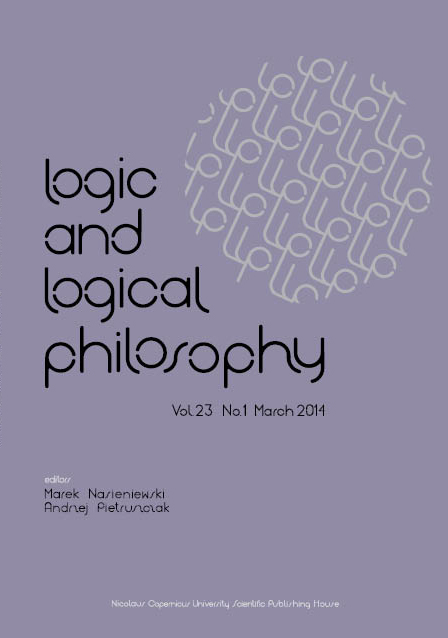An abstract approach to bivalence
DOI:
https://doi.org/10.12775/LLP.2013.028Keywords
logic, logical value, truth, falsehood, designated, non-designated, anti-designatedAbstract
This paper outlines an approach to the principle of bivalence based on very general, but still elementary, semantic considerations. The principle of bivalence states that (a) “every sentence is either true or false”. Clearly, some logics are bivalent while others are not. A more general formulation of (a) uses the concept of designated and non-designated logical values and is captured by (b) “every sentence is either designated or non-designated”. Yet this formulation seems trivial, because the concept of non-designated value is negative. In order to refine the analysis, the class of anti-designated values has been distinguished. The non-trivial version of the principle of bivalence is expressed by (c) “every sentence is either designated or anti-designated”. The last part of the paper mentions some extralogical reasons for considering the principle of bivalence with truth being a designated value as intimately connected to human thinking and behavior.References
Betti, A., 2002, “The Incomplete story of Łukasiewicz and Bivalence”, pages 21–36 in The Logica Yearbook 2001, T. Childesr and O. Majer (eds.), Filosofia, Praha.
Béziau, J.-Y., 2004, “Bivalence, excluded middle and non-contradiction”, pages 75–83 in The Logica Yearbook 2003, L. Běhounek (ed.), Filosofia, Praha.
Béziau, J.-Y., W. Carnielli and D. Gabbay (eds.), 2007, Handbook of Paraconsistency, College Publications, London.
Caleiro, C, W. Carnielli, M.M. Coniglio and J. Marcos, 2007, “Two’s company: “The humbug of many logical values “ “, pages 175–194 in Logica Universalis. Toward a General Theory of Logic, second edition, J.-Y. Béziau (ed.), Birkhäuser, Basel. DOI: 10.1007/978-3-7643-8354-1_10
Gottwald, S., 2001, A Treatise on Many-Valued Logic, Research Studies Press, Baldock.
Greniewski, H., 1970, “2n + 1 wartości logicznych” (2n + 1 of logical values), pages 127–201 in H. Greniewski, Sprawy wszystkie i jeszcze inne (All Matters and Still More), Książka i Wiedza, Warszawa.
Kotabiński, T., 1913/1969, “Zagadnienie istnienia przyszłości” (The problem of the Existence of the Future), Przegląd Filozoficzny, 16: 74–92; Eng. tr., The Polish Review, 13 (1968) , 3: 7–22.
Malinowski, G., 1993, Many-Valued Logic, Clarendon Press, Oxford.
Łukasiewicz, J., 1930/1970, “Philosophische Bemerkungen zu methrwertigen Systemen des Aussagenkalkül”, Comptes rendus de la Société des Sciences et des Letters de Varsovie, Classe III, 23: 51–77; Eng. tr.: pages 153–178 in J. Łukasiewicz, Selected Works, PWN – Polish Scientific Publishers, Warszawa 1970.
Priest, G., and K. Tanaka, 2009, “Paraconsistent Logic”, The Stanford Encyclopedia of Philosophy (Summer 2009 Edition), E.N. Zalta (ed.), Link.
Priest, G., and F. Berto, 2010, “Dialetheism”, in The Stanford Encyclopedia of Philosophy (Summer 2010 Edition), E.N. Zalta (ed.), Link.
Rescher, N., 1969, Many-Valued Logic, MGraw-Hill, New York.
Russell, B., and R. Cohn, 2012, Principle of Bivalence, Bookvika Publishing, Edinburgh.
Shramko, Y., and H. Wansing, 2011, Truth and Falsehood. An Inquiry into Generalized Logical Values, Springer, Dordrecht.
Suszko, R., 1977, “The Fregean axiom and the Polish mathematical logic in the 1920s”, Studia Logica 36: 376–380. DOI: 10.1007/BF02120672
Woleński, J., 1998, “Truth and bivalence”, pages 36–43 in The Logica Yearbook 1997, T. Childers (ed.), Filosofia, Praha.
Woleński, J., 2004, “On some formal properties of truth”, pages 195–207 in Quantifiers, Questions and Quantum Physics, D. Kolak and J. Symons (eds.), Springer, Berlin 2004; repr.: pages 91–100 in Woleński 2011.
Woleński, J., 2008, “The character of T-equivalences”, pages 511–521 in Dialogues, Logics abd Other Strange Things. Essays in Honour of Shahid Rahman, C. Dégremont, L. Keiff and H. Rückert (eds.), College Publications; repr.: pages 231–241 in Woleński 2011.
Woleński, J., 2008, “Applications of Squares of Oppositions and Their Generalizations in Philosophical Analysis”, Logica Universalis, 2, 1: 13–29; repr.: pages 255–269 in Woleński 2011. DOI: 10.1007/s11787-007-0028-5
Woleński, J. 2009, “The principle of bivalence and Suszko thesis”, Bulletin of the Section of Logic, 37, 3/4: 99–110; repr.: pages 285–292 in Woleński 2011.
Woleński, J., 2011, Essays on Logic and Its Applications in Philosophy, Peter Lang, Frankfurt am Main.
Downloads
Published
How to Cite
Issue
Section
Stats
Number of views and downloads: 1157
Number of citations: 3







